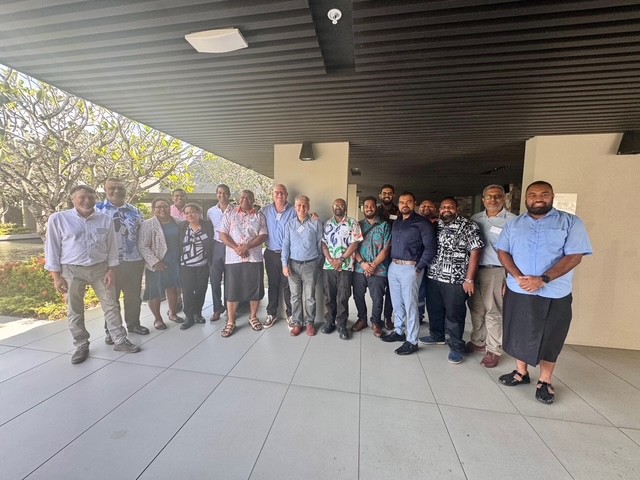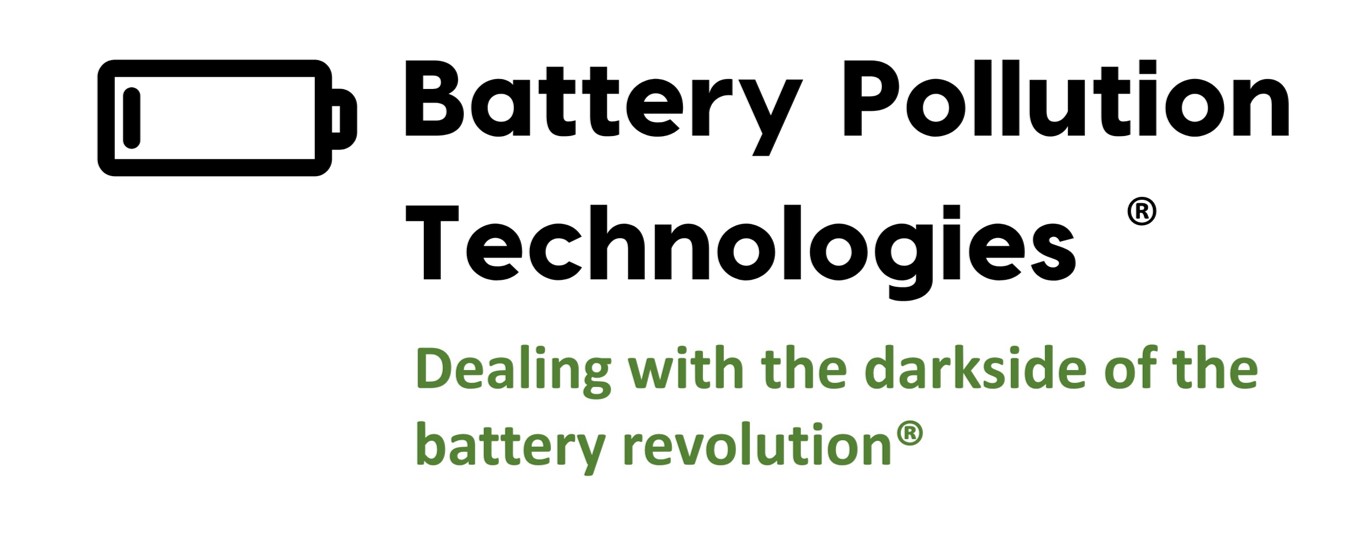Trending...
- New Article Reveals Common Pricing Pitfalls in Flooring Projects — And How to Avoid Them
- Cancer Survivor Roslyn Franken Marks 30-Year Milestone with Empowering Gift for Women Survivors
- Grammy award-winning Cuban-Canadian artist Alex Cuba releases his 11th studio album, "Indole"
This partnership will support a series of coordinated initiatives including joint research into battery end-of-life issues in tropical climates and feasibility studies for establishing a battery recycling regional hub facility in Fiji to support all Pacific Nations in a "hub and spoke" operational framework.
SYDNEY & SUVA, Fiji - ColoradoDesk -- The University of the South Pacific (USP) and Australian start-up Battery Pollution Technologies (BPT) are pleased to announce an exclusive strategic collaboration aimed at addressing battery pollution, circular economy opportunities, and sustainable energy challenges in the Pacific Islands region.
This partnership will support a series of coordinated initiatives including joint research into battery end-of-life (EoL) issues in tropical climates and feasibility studies for establishing a battery recycling regional hub styled facility in Fiji.
It also includes the evaluation of second-life battery applications to extend the usable life of lithium-based energy systems.
The partnership follows on from the First Pacific Battery Briefing that was delivered by Sydney-based Battery Pollution Technologies to various Fijian Government Agencies in May 2025.
With battery usage surging across the Pacific – driven by electrification, renewable energy storage, and mobility – the environmental and logistical challenges of safe disposal and reuse are growing. The partnership seeks to generate practical, regionally adapted solutions that prioritise environmental integrity, economic development, commercial opportunity and energy resilience.
More on Colorado Desk
Pacific Island countries face an urgent challenge in managing battery waste, driven by their geographic isolation, limited waste management infrastructure, and the vulnerability of their land and marine ecosystems.
Batteries power everything from mobile phones and solar lanterns in remote communities to electric vehicles and backup systems for island energy grids.
However, the presence of hazardous materials such as lithium, cobalt, and nickel poses significant environmental and safety risks if not properly managed.
Improper disposal can contaminate drinking water, damage coral reefs, and heighten ire hazards – especially in densely populated areas or during extreme weather events like cyclones.
As small island developing states, Pacific nations require practical, circular economy solutions that reduce dependency on imports, build local capabilities, and safeguard both the environment and cultural heritage.
For Fijian and Pacific communities, this is highly relevant as the use of batteries grows every year – from mobile phones & e-mobility scooters and bikes to the growing number of electric and hybrid vehicles.
Lithium batteries pose a unique challenge in end-of-life disposal due to their potential to catch ire, the presence of hazardous materials and the complexity of safely recycling and reusing valuable battery metals such as lithium, cobalt, copper and nickel.
"This partnership is a significant step forward in realising a circular battery economy for the Pacific," said Mansour Assaf, an Associate Professor at USP's School of Information Technology, Engineering, Mathematics and Physics (STEMP).
"By combining BPT's technical & commercial experience with USP's regional insight and research capabilities, we aim to build sustainable models that can be scaled across all island nations."
More on Colorado Desk
"This is more than a research initiative," added Nicholas Assef, Founder & Managing Director of Battery Pollution Technologies.
"It's a commitment to innovation that delivers real environmental outcomes, the potential for investment, fit-for-purpose technology development and local education and employment opportunities."
"The Pacific is one of Earth's most beautiful regions, and the environmental impact of toxic end-of-life batteries in land and water needs to stop." Nicholas Assef concluded.
The collaboration will also encompass student research opportunities, policy engagement with Pacific regional governments and battery recycling capacity-building programmes across Pacific Island countries.
A critical and time-sensitive initiative will be the rapid establishment of structured internships at The University of the South Pacific, aimed at equipping students with hands-on experience in the fast-evolving battery ecosystem.
These internships will urgently address vital areas – battery diagnostics, second-life potential, materials recovery, data systems, and safe end-of-life disposal – accelerating the development of Fijian and Pacific Nations talent needed now to drive renewable energy efforts and circular economy outcomes across the region.
Battery Pollution Technologies and The University of the South Pacific have spent the past two years working closely to bring this initiative to life.
With momentum building, both parties are now eager to accelerate progress and deliver meaningful outcomes through this vital Trans-Pacific collaboration.
This partnership will support a series of coordinated initiatives including joint research into battery end-of-life (EoL) issues in tropical climates and feasibility studies for establishing a battery recycling regional hub styled facility in Fiji.
It also includes the evaluation of second-life battery applications to extend the usable life of lithium-based energy systems.
The partnership follows on from the First Pacific Battery Briefing that was delivered by Sydney-based Battery Pollution Technologies to various Fijian Government Agencies in May 2025.
With battery usage surging across the Pacific – driven by electrification, renewable energy storage, and mobility – the environmental and logistical challenges of safe disposal and reuse are growing. The partnership seeks to generate practical, regionally adapted solutions that prioritise environmental integrity, economic development, commercial opportunity and energy resilience.
More on Colorado Desk
- Zero-Trust Architecture: NJTRX Addresses 60% of U.S. Investors' Custody Security Concerns
- Gregory A. Thomas Unveils Bold Education Reform Plan to Build Colorado's Future
- Sub-Millisecond Trading Platform: HNZLLQ Introduces Unified Gateway for Philippine Digital Asset Traders
- $2.1B Theft Losses: Bitquore Launches 1M+ TPS Platform with 95% Offline Asset Protection for U.S. Traders
- Colorado Springs Airport Launches Art at COS program
Pacific Island countries face an urgent challenge in managing battery waste, driven by their geographic isolation, limited waste management infrastructure, and the vulnerability of their land and marine ecosystems.
Batteries power everything from mobile phones and solar lanterns in remote communities to electric vehicles and backup systems for island energy grids.
However, the presence of hazardous materials such as lithium, cobalt, and nickel poses significant environmental and safety risks if not properly managed.
Improper disposal can contaminate drinking water, damage coral reefs, and heighten ire hazards – especially in densely populated areas or during extreme weather events like cyclones.
As small island developing states, Pacific nations require practical, circular economy solutions that reduce dependency on imports, build local capabilities, and safeguard both the environment and cultural heritage.
For Fijian and Pacific communities, this is highly relevant as the use of batteries grows every year – from mobile phones & e-mobility scooters and bikes to the growing number of electric and hybrid vehicles.
Lithium batteries pose a unique challenge in end-of-life disposal due to their potential to catch ire, the presence of hazardous materials and the complexity of safely recycling and reusing valuable battery metals such as lithium, cobalt, copper and nickel.
"This partnership is a significant step forward in realising a circular battery economy for the Pacific," said Mansour Assaf, an Associate Professor at USP's School of Information Technology, Engineering, Mathematics and Physics (STEMP).
"By combining BPT's technical & commercial experience with USP's regional insight and research capabilities, we aim to build sustainable models that can be scaled across all island nations."
More on Colorado Desk
- Colorado Springs: CSPD K9 Roam to Be Discharged from Veterinary Hospital; Community and Media Invited to Share Support as He Makes His Way Home
- Colorado Springs: CSPD Seeking Additional Victims in Attempted Car Jackings on Thursday, October 16th
- Colorado Springs: Podcast: It's Arts Month!
- America Anesthesia Partners Unveils New User-Friendly Website
- Hiclean Tools Releases HCX2100 Electric Pressure Washer
"This is more than a research initiative," added Nicholas Assef, Founder & Managing Director of Battery Pollution Technologies.
"It's a commitment to innovation that delivers real environmental outcomes, the potential for investment, fit-for-purpose technology development and local education and employment opportunities."
"The Pacific is one of Earth's most beautiful regions, and the environmental impact of toxic end-of-life batteries in land and water needs to stop." Nicholas Assef concluded.
The collaboration will also encompass student research opportunities, policy engagement with Pacific regional governments and battery recycling capacity-building programmes across Pacific Island countries.
A critical and time-sensitive initiative will be the rapid establishment of structured internships at The University of the South Pacific, aimed at equipping students with hands-on experience in the fast-evolving battery ecosystem.
These internships will urgently address vital areas – battery diagnostics, second-life potential, materials recovery, data systems, and safe end-of-life disposal – accelerating the development of Fijian and Pacific Nations talent needed now to drive renewable energy efforts and circular economy outcomes across the region.
Battery Pollution Technologies and The University of the South Pacific have spent the past two years working closely to bring this initiative to life.
With momentum building, both parties are now eager to accelerate progress and deliver meaningful outcomes through this vital Trans-Pacific collaboration.
Source: Battery Pollution Technologies
Filed Under: Technology
0 Comments
Latest on Colorado Desk
- All About bail Bonds Expands Presence to Serve Houston Families
- Gregory A. Thomas Announces "Economic Empowerment for All" Plan to Build an Ownership Economy in Colorado
- Thousands to Ride to L.A. Children's Hospital This Halloween Night
- Essential Living Support Opens First VA Medical Foster Home in Cheyenne, Wyoming
- Six-Figure Chicks Book Series 96 Authors, 6 Volumes Published to Empower and Mentor Women Nationwide
- LSC Destruction Launches Cutting-Edge Cryptocurrency Scanning to Hard Drive Destruction Services
- Colorado Springs: Hopeful Drive Bridge set for replacement
- Colorado Springs: Finalists for 2025 Mayor's Young Leader Awards announced
- Colorado Springs: CSPD K9 Gravely Injured while taking Barricaded Suspect into Custody
- Colorado: Polis Administration Awards $7.3 Million for Innovative Geothermal Heating and Cooling
- $150 Million Financing Initiates N A S D A Q's First Tether Gold Treasury Combining the Stability of Physical Gold with Blockchain $AURE
- Podcast for Midlife Women Entrepreneurs Celebrates 100th Episode with Rhea Lana's Founder and CEO
- What If Help Could Come Before the Fall?
- OddsTrader Examines the NHL Presidents Trophy Curse: Why Regular-Season Success Rarely Leads to Playoff Glory
- Bookmakers Review Launches Betting Insights on NBC's "The Voice: Battle of Champions"
- Indian Peaks Veterinary Hospital Enhances Pet Surgery Services for Boulder's Pet Owners
- Coming Up this Weekend on CNBC Mike Milligan Joins Tom Hegna on "Financial Freedom with Tom Hegna"
- UK Website Launches "Toy Time Machine" — Find Your Childhood Christmas Toy in One Click
- Colorado: Gov. Polis, AG Weiser Urge Supreme Court to Reject Nebraska Case on South Platte River
- Colorado: Governor Polis and Lieutenant Governor Primavera Help Launch Governors Public Health Alliance to Strengthen Preparedness, Affordability, and Health Innovation

